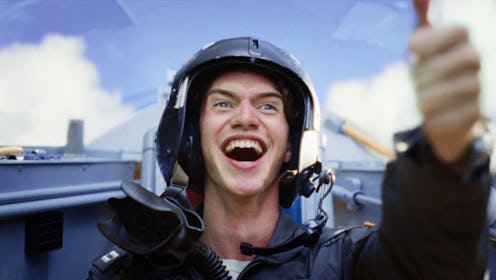Streaming
Where Is John Leonard Now After Suing Pepsi For A Harrier Jet?
The college student took a 1996 TV commercial a bit too seriously.

At the height of the so-called “cola wars” in 1996, second-place Pepsi launched its largest promotional campaign to date in an attempt to dethrone Coke. As part of their “Pepsi Stuff” rollout, the brand began airing commercials that promised, “The more Pepsi you drink, the more great stuff you’re gonna get.” The several products consumers could purchase with their “Pepsi Points” ranged from a phone card (35 points) to a mountain bike (3,300 points) and, according to the TV spots, a Harrier fighter jet for 7 million Pepsi Points. Though executives assumed the military plane’s astronomical “price” was high enough to indicate a joke, Netflix’s four-part docuseries Pepsi, Where’s My Jet? revisits the story of a 21-year-old Seattle college student John Leonard who saw the ad as a challenge and decided to call the company’s bluff.
According to The Hustle, each 12-pack of Pepsi was worth 5 points, meaning Leonard would have to consume nearly 17 million cans to reach his mark. But there was a loophole because the Pepsi catalog only required participants to submit 15 points they’d collected from cans and bottles, and the rest could be bought for 10 cents each by mailing in a check. With the help — and funding — of mountaineering buddy Todd Hoffman, Leonard put together a business plan, researched case law on promotional advertisements, and convinced several other investors he’d met while working as a climbing guide — to raise the $700,000 he’d need to purchase the 7 million Pepsi points. (For context, a Harrier jet cost about $33 million to manufacture, though it wouldn’t be available to the public, regardless.)
After finally raising the money he needed, Leonard mailed Pepsi his 15 points, along with a check for $700,008.50, which included shipping costs. He received a response several weeks later, containing his returned check, some coupons, and a note stating that the jet was just a “fanciful” part of the TV commercial. However, Leonard had already spent roughly $4,000 on legal consultation and researching case law on deceptive advertising, so he hired an attorney and continued his pursuit for the jet.
Raymond E. McGovern Jr., a vice president at BBDO New York, the advertising firm that created the Pepsi Stuff commercial, replied to Leonard: “I find it hard to believe that you are of the opinion that the Pepsi Stuff commercial really offers a new Harrier Jet,” adding, “No reasonable person would agree with your analysis of the commercial.”
So Leonard filed a lawsuit against Pepsi for breach of contract, claiming the ad constituted a binding offer. Still, he insisted that he “didn’t want any publicity” to come from his request for the jet. “I’m not trying to make a statement. I’m not looking for a settlement. I just want a plane,” he said, later explaining to the Associated Press that he was “simply trying to take Pepsi up on an offer it made to the public.”
However, PepsiCo countersued Leonard in New York, seeking to recoup $88,162 in attorney’s fees and dismiss Leonard’s claims as frivolous without going to trial. “Tens of millions of Americans, and people around the world, saw the spot, got the joke, and laughed,” a spokesperson for PepsiCo told CBS. “Mr. Leonard saw the spot, hired business advisers and lawyers, and decided to take legal action.”
After a three-year legal battle, New York’s Southern District Court judge Kimba Wood ruled in Pepsi’s favor on Aug. 5, 1999. Though Leonard filed an appeal in 2000, he was ultimately unsuccessful.
As of August 2021, Leonard — who appears in the Netflix doc with Hoffman — was living in Alaska, where he worked as the chief mountaineering ranger at Denali National Park before he was promoted to the DC Bureau of the National Park Service. As noted in Pepsi, Where’s My Jet?, Leonard has also “moved on to further adventures, the most significant being his beautiful wife and kids.
In a recent interview with The Guardian, Leonard also commented on whether he had any reservations about the Netflix series renewing attention on his case more than two decades later “Over the years I’ve been sensitive to it, because even close people have said: ‘Well, you’re an opportunist,’” he said. “Lawsuits like this end up being compared to the McDonald’s hot coffee case, the kind of ambulance-chaser thing. And that hit me wrong. Looking back on it, it was opportunistic. Absolutely. But that’s not always a negative thing. And back then I wholeheartedly thought that we were going to get the jet.”
He continued, “What I struggle with today is how can I have really thought that I was going to get the jet? I’m 48 years old now, and I’m now looking back on it like: What kind of dipshit were you, man?”